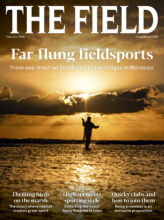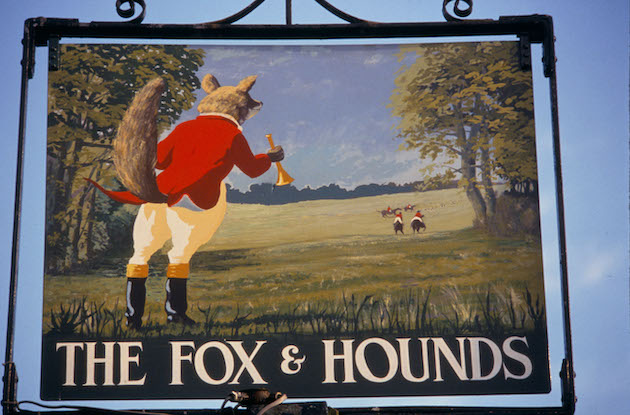Tracing the origins of some of Britain’s most fascinating pub signs takes one on a journey through history, literature and sporting excellence, says Rory Knight Bruce
There is more to pub signs than you might first think, says Rory Knight Bruce as he takes us on a tour of some of the most interesting around the country.
Arm yourself with The Field’s pick of the best summer recipes, whether you’re picnicking pitchside at the polo or dreaming of a balmy supper in the garden with the rain safely kept at bay.
The country house chicken comes in all shapes and sizes, with eggs from brown in hue to blue; but which breeds are in vogue? Martha Terry finds out.
ALL YOU NEED TO KNOW ABOUT PUB SIGNS
Not since the whisky ran out in the Hebrides in Sir Compton Mackenzie’s novel Whisky Galore have pub landlords, those purveyors of good cheer, been more in need of our thanks and support.
Everyone will be familiar with at least one pub called the Fox & Hounds. But two – one on Dartmoor, the other in deepest Hertfordshire – have further tales to tell. At the Fox & Hounds at Bridestowe, in the hunting country of the Spooners and West Dartmoor, a full hunting mural may be found in the lower bar. It was painted by a German prisoner of war called Willie Brandt (not the future German chancellor), who so disliked Hitler – who himself hated hunting – that he spent his days of freedom on this sporting artwork. After the war, Brandt made his home in Devon, his mural much admired. In Barley, Hertfordshire, there is a gantry that rises over the road leading to the Fox & Hounds. In silhouette, it depicts hounds and huntsmen in full cry. “We are a traditional Hertfordshire pub and do lots of shoot breakfasts,” says Ricky Williams of the Fox & Hounds. “The continuing novelty of the gantry attracts a good crowd of countrymen.”
Of course, many sporting pub signs state the obvious, claiming their origins as former coaching inns or bearing the coat of arms from neighbouring aristocrats. But this does not mean they should be denied a place in the ostler’s roll of honour. The George of Stamford, the Trumpet at Much Marcle, the Talbot at Knightwick, the Buccleuch Arms at Newtown St Boswells, the Swan at Tarporley and, of course, Jamaica Inn on Bodmin Moor are all famous ‘staging posts’. Several pubs are also called the First In, Last Out, a coaching term meaning that, in the relay of coaching horses, the first ones in – those that did the heavy pulling at the front of the team – would be the last to go out again.
I cannot claim much association with the Bruce Arms near Pewsey (nor have I been in), but it tells us that nearby once lay the seat of the Brudenell-Bruces of Tottenham House, where the Elgin Marbles were first brought before being disbursed to the British Museum and elsewhere.
Nearer to me in Devon is the General Sir Redvers Buller pub in Crediton, so named after the Boer War general. How long his name and picture will stay on the pub sign remains to be seen, as his equestrian statue in Exeter, on his fine charger Biffin, has only recently narrowly escaped removal by the city council in response to protests.
Protestors had slightly more success with the historic Black Bitch pub in Linlithgow, Scotland, so named for more than 350 years. Its sign – and indeed the Burgh coat of arms – features a black greyhound chained to an oak tree. The greyhound’s master had been banished to an island in the Firth of Forth and sentenced to starve to death. The greyhound used to swim from the town every day with food for him. The townspeople took the dog’s loyalty and bravery as symbolic of their own and adopted her as their symbol. The pub had tried as a compromise to change its name to the Black Hound, but it seems in the near future it will become the Willow Tree.
PORTRAITS ON PUB SIGNS
Although plenty of pubs are named after local squires, few people have had their portraits put on a pub sign. However, at the Beaufort Arms at Hawkesbury Upton, Gloucestershire, ‘Master’, the 10th Duke of Beaufort, adorns one. Also in the Beaufort hunting country is the Hunters Hall at Kingscote, whose sign has on one side the mustard livery of a Berkeley huntsman and on the other the blue and buff of the Beaufort. This is in honour of the annual end-of-season meet between the two neighbouring packs. In Warwickshire, a pub honours the many racing feats of Sir William Dugdale, David Cameron’s war-decorated uncle and an accomplished amateur jockey who rode the 1952 Grand National on Cloncarrig. Previously called the Hanging Gate, it changed its name to the Horse & Jockey with, until a recent change of hands, Sir William and Cloncarrig on its sign.
But it would be wrong to leave Badminton without mentioning the Cat & Custard Pot at Shipton Moyne, one of several first mentioned by RS Surtees in Handley Cross. “Pigg and Ben trotted on with the hounds and, when they reached the meet – the sign of the Cat & Custard Pot on the Muswell Road – they found an immense assemblage, some of whom greeted Pigg with the familiar enquiry ‘What he’d have to drink?’” At the end of the day, they repaired to the tavern. “‘O Pigg, let us fraternise!’” says Jorrocks, whereupon he “seized Pigg by the middle, and hugged him like a polar bear”. Such scenes would not be unknown after hunting in Shipton Moyne today.
For many years, it was believed that another Grand National hero, this time an equine one, was commemorated at a pub outside Hexham as the Bay Horse. “I think it was just a rumour put about,” says its landlady Hilda Wright, who was also, for 10 seasons, secretary of the Border Foxhounds, which meet at the pub each New Year’s Day. Some years ago, the sign was taken down and a painting of Wright’s own pony, Prince, now has pride of place. “He lived to be 20 and was an Irish 3/4 bred,” she says. “I don’t think he could have won the Grand National.”
Of all the mysteries of pub signs, however, none can surely rival the name the Moon Under Water. The Wetherspoon’s brewing empire has no fewer than 13 establishments of that name. It came about from an essay written in 1946 by George Orwell in the London Evening Standard. Orwell was not a great pub man (and he once admitted in Down and Out in Paris and London he thought no one became more interesting after more than two drinks). But the Moon Under Water is his idealisation of what any great pub should be. “The grained woodwork, the ornamental mirrors behind the bar, the cast-iron fireplaces, the florid ceiling stained dark yellow by tobacco-smoke, the stuffed bull’s head over the mantlepiece… the barmaids know most of their customers by name and, irrespective of age or sex, call everyone ‘Dear’ (not ‘Ducky’, pubs where the barmaid calls you ‘ducky’ always have a disagreeable raffish atmosphere).” Orwell also favoured draught stout “and it goes better in a Pewter pot”.
However, things sometimes did not go better in a pewter pot, such as when drunken swains were press-ganged into joining the Navy by having the ‘King’s shilling’ popped into their beer mugs. In naval port pubs from Portsmouth to Plymouth, they went in for what Orwell called “a creamy pint of stout” and woke up in the Azores. The 16th-century Minerva Inn in a Plymouth backstreet (so named after the Roman goddess) was one such establishment, complete with a secret subterranean tunnel to smuggle out the victims. Many pewter mugs were given glass bottoms so the drinker could see if the ‘King’s shilling’ had been dropped into it and make good their escape.
‘GOD IS COMING’
Sometimes, it is the pub that has to make good its escape from an earlier name. There are several Drum & Monkeys which, it is said, take their meaning from Victorian soldiers returning home with pet monkeys that could beat a drum. One of them, near Minsterley, in Shropshire, was where Mary Webb wrote her hunting epic Gone to Earth. It is now renamed Abel’s Harp, after Abel Woodus, the harpist and coffinmaker in Webb’s book. But this change of name cannot erase the memory of when, in 1977, the Drum & Monkey played host to Faces guitarist Ronnie Lane, who had ‘gone native’ and bought a farm nearby, and Eric Clapton. ‘God is coming’, the chalkboard outside proclaimed. “Some of us got in through the toilet window,” recalls local photographer Dave Bagnall. Abel’s Harp is now popular for spiritual retreats and baby showers.
Not far away, on the banks of the River Severn, is the Mytton & Mermaid, bought in the 1930s by Portmeirion architect Clough Williams-Ellis and turned into the welcoming hotel it is today. The mermaid reference is obscure, but Mytton refers to Squire John ‘Mad Jack’ Mytton of Halston Hall, in Shropshire, MP, High Sheriff and Master of his own harrier pack. Arriving with hounds at what was then called the Talbot Arms, Mytton found the powerful Severn in full spate and swam it on his horse with the words: “He that calls himself a sportsman, let him follow me.” An etching by TJ Rawlins records the scene.
In Pimperne, Dorset, the Farquharson Arms is little of what remains to remind us of Squire Farquharson, known as ‘the Meynell of the West’, who hunted all Dorset as Master six days a week for 52 seasons from 1806 to 1858. He kept 50 horses and 75 couple of hounds. A century later, Sir Peter Farquhar, then hunting the Portman, asked one of Farquharson’s descendants if he would care to join him in the Mastership. He declined with the words: “I think my family have spent enough money on foxhunting.”
For those of us weaned on the 1949 film Whisky Galore! and its thrall to uisge beatha, another worthy destination is the Polochar Inn, meaning ‘inlet of the stone’, on South Uist. It refers to a standing stone nearby, dating from the Bronze Age, 2,000BC. Scots art writer Mary Miers, in her book The Western Seaboard, describes it as “a ferry inn and post office at the old crossing point to Barra”. With her and travel writer Barnaby Rogerson, I visited the pub in 1985, having walked all day. The landlord offered me a dram of whisky that had been salvaged from the wreck of the SS Politician, the cargo ship carrying 22,000 cases of finest malt whisky upon which Sir Compton Mackenzie based his story. Up from under the bar, its label gone, came the bottle, greened by sea water. What was it like? As I said to the landlord at the time: “Nectar.”





